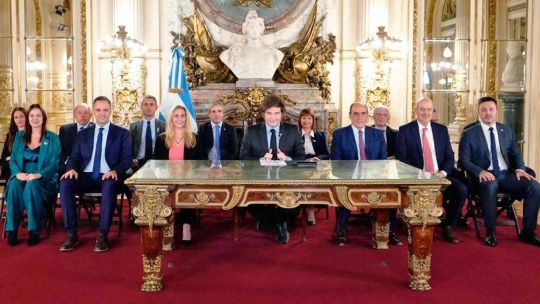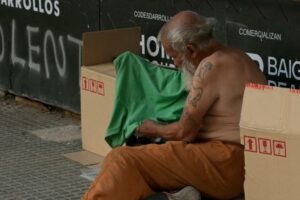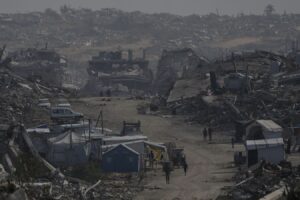
As campaigning drew to a close ahead of Sunday’s legislative elections, President Milei removed any doubt about his future plans. “Looking ahead to the second half of this term, I’m going to reorganise the Cabinet to achieve the goals of second-generation reforms,” he said in an interview. On the night of the 26th [of October], with all the results in, I’ll assess what kind of structure I need to meet those objectives.”
Milei has made it clear: his ministerial team will not be the same come Monday. But that announcement also raises a pressing question: will the reshuffle be guided solely by his agenda, or also prompted by a poor electoral result? And to what extent is he willing to concede or renegotiate political power in order to overcome the parliamentary weakness that continues to plague him?
Cabinet chief
The name currently attracting the most attention is that of Santiago Caputo – the political consultant and strategist who looks set to step out from the shadows. Within the Casa Rosada, many are taking it as a given: he would become Cabinet chief if Milei chooses to consolidate internal power and tighten his circle of trust.
Foreign minister
Worn out by internal tensions and the toll of international diplomacy, Gerardo Werthein has tendered his resignation. One rumour suggests Cabinet Chief Guillermo Francos could be moved into the role, where his diplomatic and political experience could help rebuild bridges. Among Milei’s other allies, Luis Juez and Rodrigo de Loredo are being mentioned as key interlocutors to strengthen provincial and legislative support for the administration.
Justice minister
All signs suggest Mariano Cúneo Libarona will leave his post. Two names are being considered as replacements: Guillermo Montenegro, current mayor of General Pueyrredon, Mar del Plata, a figure with a judicial background. Backed by sectors of the PRO, he enjoys a positive public image and is seen as the frontrunner over Sebastián Amerio, a lawyer close to Santiago Caputo who has a more technical profile and is favoured by the President’s inner circle.
Security and Defence ministers
Both portfolios are certain to see new appointments. Patricia Bullrich will leave the National Security Ministry to take up a Senate seat, while Luis Petri will do the same at the Defence Ministry. Potential replacements include Diego Valenzuela, mayor of Tres de Febrero, Buenos Aires Province, who is close to moderate sectors of PRO, and Alejandra Monteoliva, a former head of the Federal Police and a technical expert in the field. She is Bullrich’s own recommendation to continue her “no-nonsense order” approach.
Interior minister
Current Minister Lisandro Catalán faces an uncertain future. While he maintains good ties with Milei, his position may be under threat if Francos moves to the Foreign Ministry. The Interior Ministry is crucial for dealings with provincial governors and Congress and could be reshaped either with a more politically astute figure or, conversely, a more administrative and austere profile.
Economy minister
Luis ‘Toto’ Caputo’s position is not guaranteed. Although he retains presidential support, some within the government believe Milei may seek someone with a more political profile to help steer the second wave of reforms through Congress.
Deregulation czar
Federico Sturzenegger, in charge of state modernisation and deregulation, is one of the administration’s most solid figures. The President sees him as a key architect of the structural reform programme.
Human Capital minister
Internally, Sandra Pettovello is among the most highly regarded members of Milei’s Cabinet. Despite speculation, she will remain firmly in charge of the so-called “super ministry” that encompasses the Social Development, Labour and Education portfolios.
Health minister
Health Minister Mario Lugones will also stay on. At the Casa Rosada, he is considered part of the “effective management core,” with strong performance in his portfolio.





